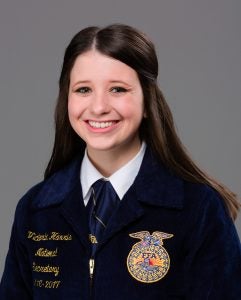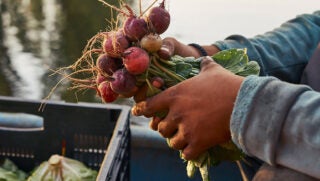When Victoria Harris first joined her local Florida FFA chapter, she wasn’t quite sure of her place in the organization. Today the biology major from the University of Florida has found her place at the national level. Harris was elected to serve as the National FFA Secretary at this year’s 89th National FFA Convention & Expo. We had some questions for Harris on why she chose FFA in the first place, her best FFA memory, and where she sees the future of FFA headed.
Q. Why FFA?
A. I did not grow up on a farm or anywhere near one, so I had no idea what agriculture or the FFA was until I stepped into my first agriculture class in the tenth grade. I had signed up for a veterinary assisting class because I loved dogs and was considering the field of veterinary medicine. In this course, my teacher explained what FFA was and how there was a Career Development Event relating to Veterinary Science, which would allow me to test my skills in a competitive environment. Immediately, I signed up. Joining the FFA made me realize how many opportunities are offered and challenged me to get more involved.
Q. Favorite FFA memory?
A. One of my favorite FFA memories took place my senior year while preparing for a career development event called Agricultural Issues which requires students to host a mock debate on an agricultural issue in their community. My team decided to focus on the foreign importation of strawberries into our local community of Plant City, Florida, which is the top producer of winter strawberries in the world. After presenting at the chamber of commerce, we stopped by a very popular and local farmer’s market and got strawberry milkshakes … It was so rewarding for me to learn about local agriculture and the role it played in my community, and that was one of the best milkshakes I have ever had! What I love about FFA is that the small moments are just as enjoyable as the huge ones.
Q. Most influential moment in FFA?
A. For me, my most influential moment in FFA was attending the Doris Sanders FFA chapter banquet as a state officer. When I arrived, it seemed like a normal banquet with lots of community members, decorations, and food; but I soon learned that all of the students at the school had a severe cognitive or physical disability. Watching the students receive awards and host the banquet allowed me to truly understand that FFA grants opportunity to every student. I was able to see how these students were able to achieve success and grow as leaders, despite their limitations, because of FFA. It really opened my eyes to what FFA does and what it can do.

Q. What do you think is one thing many people might not realize about the Florida FFA program?
A. I think people may not realize that Florida is incredibly robust agriculturally and has a wide diversity of different types of production … With this, we also have a large array of students who are interested in the leadership, entrepreneurial, and scientific ideals harbored through FFA. In fact, some of our strongest FFA chapters are located in the city of Miami and in the heart of Orlando. The diversity of Florida agriculture allows urban, rural, and suburban students to find their niche within the FFA.
Q. Florida versus National office- What experiences are you taking from your state chapter into your national role?
A. Similar to National FFA officers, Florida FFA officers postpone a year of college to serve FFA members and help showcase what the blue corduroy jacket means. During my time as a state officer, I completed roughly 35 chapter visits and hosted four different conferences. My state officer team was also granted the ability to tour agriculture in Iowa and South Africa, and I was afforded the opportunity to attend the State Presidents’ Conference hosted by National FFA and speak to congressmen in Washington, D.C. National FFA officers have a similar mission and complete similar tasks, though on a much larger scale. My role as a state officer allowed me to understand how to make decisions for the betterment of the organization, and not just myself. I know this will be an essential skills to represent FFA members from across the United States.
Q. What’s a typical day entail for you as National Secretary?
A. Though my journey has just begun, what I love about this position is that each day is very different yet focuses on the same goal: advancing the FFA. A typical day with students normally involves waking up early to attend a convention which entails: meeting students, watching sessions, delivering a workshop, giving a keynote, and helping the state FFA officers prepare for the next session. The days are typically long, with responsibilities like returning emails and phone calls scattered in, though incredibly rewarding as FFA members are the heart of the organization. Another type of day is one spent with stakeholders, learning about their goals and informing them on how FFA can help them. Between this are lots of training, agriculture tours, a trip to Japan to meet FFJ members ( Future Farmers of Japan), and meetings with legislators.
Q. Where do you see the future of FFA headed?
A. I think the National FFA Organization is as strong, robust, and diverse as ever and I think we will continue to make leaps as we strive to grow leaders, build communities, and strengthen agriculture. Already, FFA is active inside schools in both cities and suburbs but I will believe we will see more of this as people learn about the rigor and relevance of agricultural education. My team and I are incredibly passionate about diversity and inclusion, as we all have very different backgrounds. Working with them reminds me that FFA showcases the uniqueness of individuals, while uniting them around a common purpose. For me, the future of FFA looks like embracing our differences to make a brighter and stronger tomorrow.


